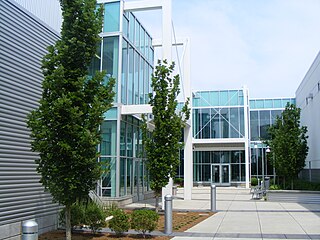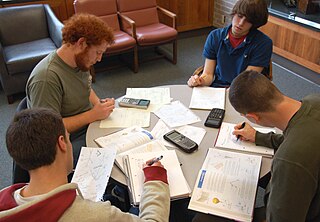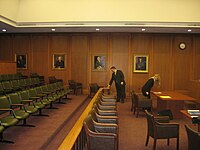
Admission to the bar in the United States is the granting of permission by a particular court system to a lawyer to practice law in the jurisdiction. Each U.S. state and jurisdiction has its own court system and sets its own rules and standards for bar admission. In most cases, a person is admitted or called to the bar of the highest court in the jurisdiction and is thereby authorized to practice law in the jurisdiction. Federal courts, although often overlapping in admission standards with states, set their own requirements.

The Law School Admission Test is a standardized test administered by the Law School Admission Council (LSAC) for prospective law school candidates. It is designed to assess reading comprehension, analytical reasoning, and logical reasoning. The test is an integral part of the law school admission process in the United States, Canada, the University of Melbourne, Australia, and a growing number of other countries.

The American Bar Association (ABA) is a voluntary bar association of lawyers and law students; it is not specific to any jurisdiction in the United States. Founded in 1878, the ABA's stated activities are the setting of academic standards for law schools, and the formulation of model ethical codes related to the legal profession. As of fiscal year 2017, the ABA had 194,000 dues-paying members, constituting approximately 14.4% of American attorneys. In 1979, half of all lawyers in the U.S. were members of the ABA. The organization's national headquarters are in Chicago, Illinois, and it also maintains a significant branch office in Washington, D.C.
Boston College Law School is the law school of Boston College, a private Jesuit research university in Chestnut Hill, Massachusetts. It is situated on a 40-acre (160,000 m2) campus in Newton, Massachusetts, about 1.5 miles (2.4 km) from the university's main campus in Chestnut Hill.
A bar examination is an examination administered by the bar association of a jurisdiction that a lawyer must pass in order to be admitted to the bar of that jurisdiction.
The Association of American Medical Colleges (AAMC) is a nonprofit organization based in Washington, D.C. that was established in 1876. It represents medical schools, teaching hospitals, and academic and scientific societies, while providing services to its member institutions that include data from medical, education, and health studies, as well as consulting. The AAMC administers the Medical College Admission Test and operates the American Medical College Application Service and the Electronic Residency Application Service. Along with the American Medical Association (AMA), the AAMC co-sponsors the Liaison Committee on Medical Education (LCME), the accrediting body for all U.S. MD-granting medical education programs.

The American University Washington College of Law is the law school of American University, a private research university in Washington, D.C. It is located on the western side of Tenley Circle in the Tenleytown section of northwest Washington, D.C. The school is accredited by the American Bar Association and a member of the AALS.

A law school is an institution, professional school, or department of a college or university specializing in legal education, usually involved as part of a process for becoming a judge, lawyer, or other legal professional within a given jurisdiction. Depending on the country, legal system, or desired qualifications, the coursework is undertaken at undergraduate, graduate, or both levels.
The University of CalgaryFaculty of Law, at the University of Calgary. is a law school in Calgary, Alberta.

Law school rankings are a specific subset of college and university rankings dealing specifically with law schools. Like college and university rankings, law school rankings can be based on empirical data, subjectively-perceived qualitative data, or some combination of these. Such rankings are often consulted by prospective students as they choose which schools they will apply to or which school they will attend. There are several different law school rankings, each of which has a different emphasis and methodology.

Humphreys College Laurence Drivon School of Law is an independent, nonprofit law school located in Stockton, California. The School of Law is approved by the Committee of Bar Examiners of the State Bar of California and the Western Association of Schools and Colleges but neither has nor seeks accreditation by the American Bar Association.

Nashville School of Law, is a private law school founded in 1911. The school's students attend classes at night on a part-time basis.
The Enrollment Management Association, formerly known as the Secondary School Admission Test Board (SSATB), is a nonprofit organization founded in 1957 in the United States by independent school admission officers with three goals in mind: to provide a forum for exchange and support among admission professionals, to create an admission test for use by private schools, and to assist parents and students in their independent school search.

National Testing Service - Pakistan (NTS) is a nonprofit organization in Pakistan that administers academic performance evaluation tests. It is similar to Educational Testing Service (ETS) in the United States. NTS is a member of the International Association for Educational Assessment. It is also recognized by the Higher Education Commission.

Test preparation or exam preparation is an educational course, tutoring service, educational material, or a learning tool designed to increase students' performance on standardized tests. Examples of these tests include entrance examinations used for admissions to institutions of higher education, such as college, business school, law school, medical school, BMAT, UKCAT and GAMSAT and graduate school and qualifying examinations for admission to gifted education programs.

The Inter American University of Puerto Rico, Faculty of Law is the school of law of the Inter American University of Puerto Rico, a private co-educational corporation accredited by the Middle States Association of Colleges and Schools, the Puerto Rico Council of Higher Education, and the Commonwealth of Puerto Rico Department of Education. The School of Law is approved by the American Bar Association (ABA) and is located in San Juan, the capital city of Puerto Rico. Since its founding, the School of Law has succeeded in meeting the needs of the legal profession, in particular, and Puerto Rico's society in general.

Logic games, abbreviated LG, and officially referred to as analytical reasoning, is one of three types of sections that appear on the Law School Admission Test (LSAT). A logic games section contains four 5-8 question "games", totaling 22-25 questions. Each game contains a scenario and a set of rules that govern the scenario, followed by questions that test the test-taker's ability to understand and apply the rules, to draw inferences based on them. In the words of the Law School Admission Council (LSAC), which administers the test, it "measure[s] the ability to understand a structure of relationships and to draw logical conclusions about that structure". Like all other sections on the LSAT, the time allowed for this section is 35 minutes. While most students find this section to be the most difficult section on the LSAT, it is widely considered the easiest and fastest to improve at once the right strategies are learned and employed.
Widener University Commonwealth Law School is a law school located in Harrisburg, Pennsylvania, and part of Widener University, a private university in Chester, Pennsylvania. It is one of two separate ABA-accredited law schools of the university. It was founded in 1989 as an expansion of Widener University's law school in Wilmington. It awards the Juris Doctor degree in its full-time and part-time programs and is a member of the Association of American Law Schools (AALS).

In the United States, those seeking to become lawyers must normally pass a bar examination before they can be admitted to the bar and become licensed to practice law. Bar exams are administered by states or territories, usually by agencies under the authority of state supreme courts. Almost all states use some examination components created by the National Conference of Bar Examiners (NCBE). Forty-one jurisdictions have adopted the Uniform Bar Examination (UBE), which is composed entirely of NCBE-created components.











